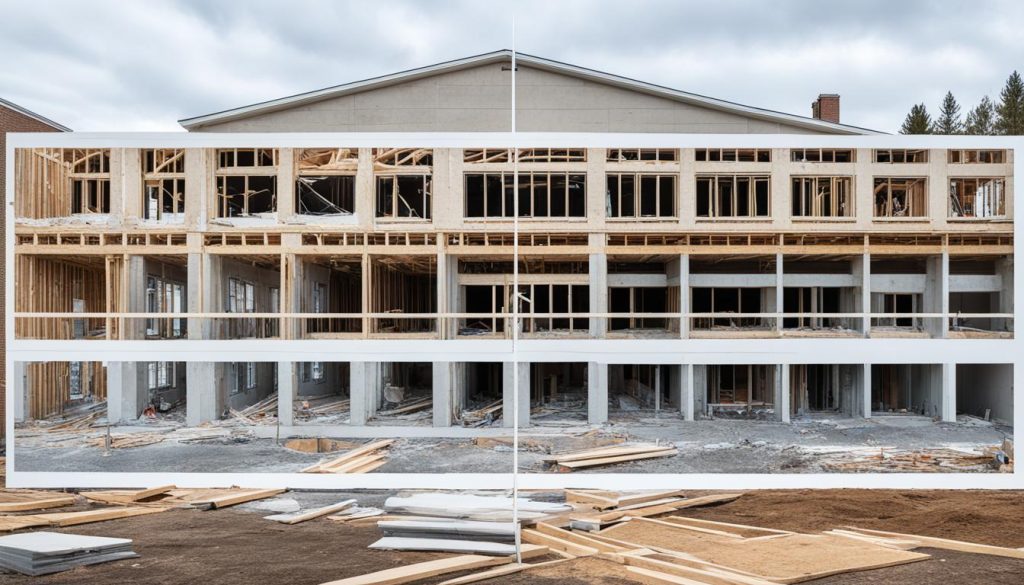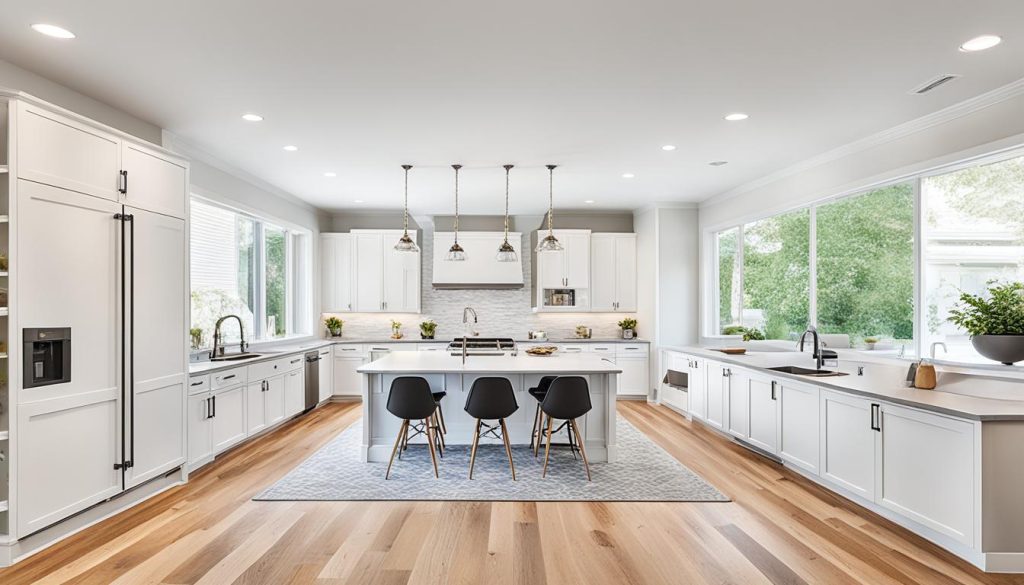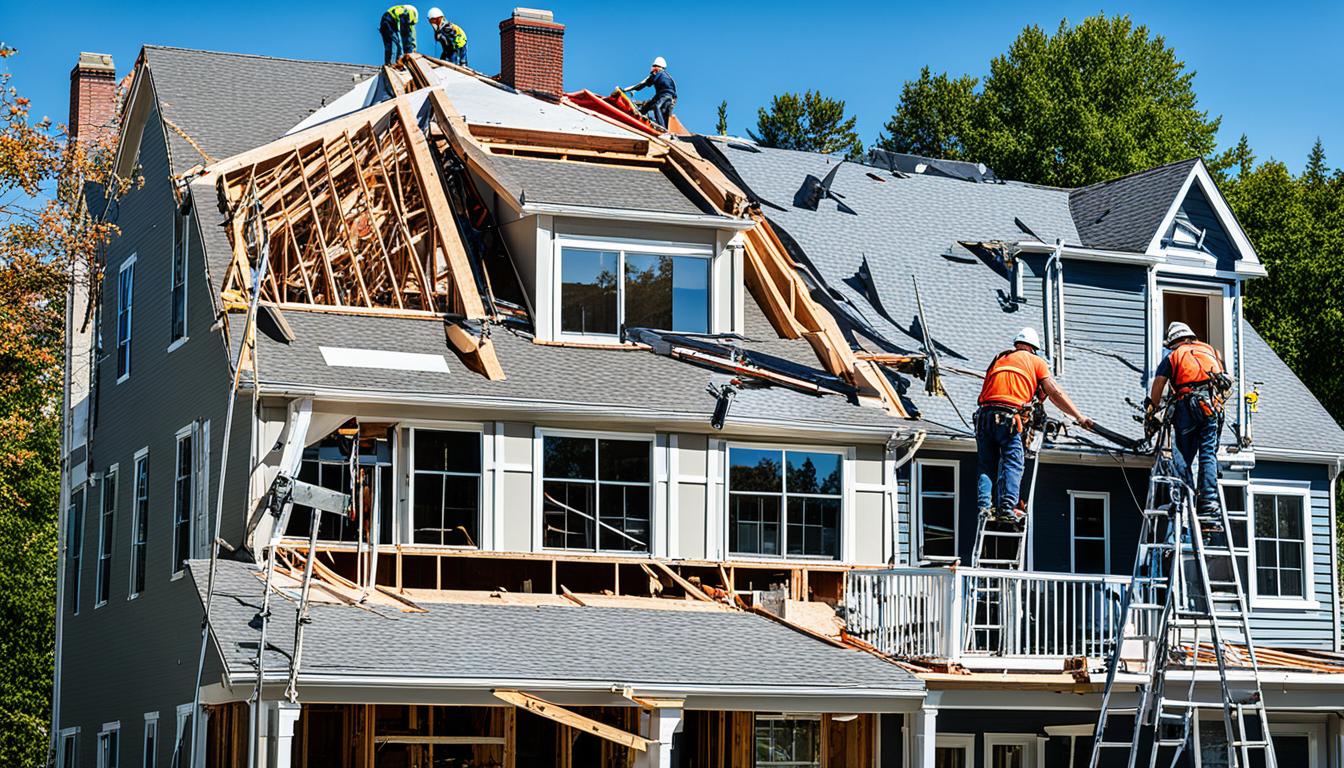Did you know that homeowners in Canada spent an estimated $80 billion on home renovation projects in 2020? That’s a staggering amount, highlighting the significance of home improvement in the country. But when it comes to deciding between renovating your current home or building a new one, how do you determine the best choice for your needs and goals?
In this comprehensive guide, I will explore the factors that influence this decision-making process. From cost considerations and project duration to design control and flexibility, we will delve into the pros and cons of renovation and new construction. By the end, you’ll have a clearer understanding of which option aligns best with your budget, timeline, and vision for your dream home.
Key Takeaways:
- Homeowners in Canada spent a staggering $80 billion on home renovation projects in 2020.
- Deciding between renovating and building new requires careful consideration of factors like cost, project duration, and design preferences.
- Renovating offers potential cost savings and the ability to preserve the character of older buildings, while building new allows for full customization and modern features.
- Consulting with construction professionals can provide personalized advice and insights tailored to your specific project goals and needs.
- Ultimately, the decision should align with your budget, timeline, and long-term vision for your dream home.
The Cost Consideration
When deciding between renovation and new construction, the cost of the project is often a crucial factor to consider. The expenses associated with building new can be higher compared to renovating an existing space.
Building new involves various costs, such as site preparation, utilities installation, and constructing the entire structure from scratch. These initial expenses can significantly impact your budget.
On the other hand, renovating an existing space can be a more cost-effective option. By reusing some elements of the building, such as the foundation or framework, you may be able to lower the overall cost of the project. This can be particularly advantageous if your existing space has strong structural elements that can be incorporated into the renovation process.
However, it’s important to note that the age of the building and the extent of renovations required can also affect the overall cost. Older buildings may require more extensive renovations, leading to higher expenses.
To make the most informed decision regarding cost, it’s advisable to consult with professionals who can provide accurate estimates based on your specific project requirements and goals.
Project Duration Comparison
When it comes to deciding between renovating your current home or building a new one, project duration is an important factor to consider. Let’s take a closer look at the timeline for each option.
New Build
Building a new home involves several steps that can significantly impact the project duration. These steps include site preparation, utility installation, and constructing the entire structure from scratch. As a result, the construction of a new home is generally a longer process compared to renovating an existing space.
Renovation
Renovating an existing space can be a quicker option, especially if the renovations are not extensive. Since the foundation and structure are already in place, the focus is primarily on making improvements and modifications. However, the timeline for renovations can vary depending on the complexity of the project and any unexpected issues that may arise during the process.
It’s important to note that these timelines are general estimates and may vary based on the scope of the project, availability of materials and contractors, and other factors.

| New Build | Renovation | |
|---|---|---|
| Project Duration | Several months to a year or more, depending on the size and complexity | Several weeks to several months, depending on the extent of renovations |
| Main Tasks | Site preparation, utility installation, construction | Improvements, modifications, updates |
| Factors Affecting Duration | Availability of materials, weather conditions, permits and inspections | Scope of renovations, unexpected issues, availability of contractors |
As you can see from the comparison table above, the project duration for a new build can span several months to a year or more, depending on the size and complexity of the project. On the other hand, renovations generally take several weeks to several months, depending on the extent of the renovations.
Ultimately, the decision between renovating or building new should consider not only the project duration but also other factors such as cost, design control, and personal preferences.
Design Control and Flexibility
When faced with the decision of whether to renovate your existing home or build a brand new one, one important consideration to keep in mind is design control and flexibility.
Choosing to build a new home provides you with an unparalleled level of control and customization options. You have the freedom to design the project according to your specific needs, preferences, and lifestyle. Whether it’s an open-concept layout, a custom kitchen, or a home office, building from scratch allows you to bring your dream home to life.
On the other hand, renovating an existing space does offer some flexibility in terms of design. While you may be limited by the structure and layout of the current building, there is still room for creativity and personalization. You can make changes to the interior, update the fixtures and finishes, and transform the space to better suit your style.
It’s also worth noting that historical buildings and unique older properties can offer a distinct aesthetic charm that is challenging to replicate with new construction. The character and craftsmanship of these homes can create a truly one-of-a-kind living experience. This can be a significant factor for those who value the charm and history of older homes.

| Renoavation | New Construction |
|---|---|
| Requires working within existing structure | Complete control over design and layout |
| May be limited by building codes | Fully compliant with the latest building codes and standards |
| Potential surprises and challenges during renovations | Less uncertainty and potential for unexpected issues |
| Opportunity to preserve historic elements | Modern features and technology |
| Can be more cost-effective in certain cases | Potential for higher upfront costs |
Pros and Cons of Renovating
When deciding between home renovation vs new construction, it’s important to consider the pros and cons of renovating your existing property. Renovating a home offers several advantages, as well as some potential drawbacks.
Advantages of Renovating:
- Potential cost savings: Renovating your home can often be more cost-effective compared to building new. By reusing existing structures and materials, you can save money on construction costs.
- Increased property value: Renovations can improve the value of your home, making it a wise investment for the future.
- Personalization: Renovating allows you to tailor your space to your specific needs and preferences, creating a home that reflects your style and lifestyle.
- Preserving character: Older buildings often have unique architectural features and historical charm that can be preserved through renovations.
- Potential environmental benefits: Repurposing materials and reducing waste through renovation projects can contribute to a more sustainable environment.
Drawbacks of Renovating:
- Risk of unexpected costs: Renovations can encounter unforeseen issues that may increase the overall project cost.
- Disruption to daily life: The renovation process can be disruptive, as it may require temporary relocation or living in a construction zone.
- Limitations on changes: Renovating an existing structure comes with limitations in terms of what can be changed or improved based on the building’s current layout and structural integrity.
Overall, renovating offers the flexibility to breathe new life into your home while considering factors like cost, personalization, and environmental sustainability. However, it’s essential to weigh the advantages and drawbacks carefully before making a decision.
Now that we have explored the pros and cons of renovating, let’s move on to comparing them with the advantages and disadvantages of building new in the next section.
Pros and Cons of Building New
When it comes to the decision between home renovation and new construction, building a new home offers several advantages. Let’s explore the pros and cons of building new:
Advantages of Building New
- Full Customization: Building new allows you to create a home that perfectly suits your needs and preferences. From the layout to the finishes, you have complete control over the design.
- Modern Features and Technology: New construction offers the opportunity to incorporate the latest advancements in home automation, energy efficiency, and sustainable building materials.
- Potentially Lower Long-Term Costs: New homes are often more energy-efficient, which can result in lower utility bills and reduced maintenance costs over time.
- Less Maintenance: With new construction, you won’t have to worry about outdated wiring, plumbing, or structural issues that often come with renovating older homes.
- Warranty Protection: Most new homes come with warranties that cover defects in construction, providing peace of mind for homeowners.
- Energy Efficiency: Building new allows you to incorporate energy-saving features, such as insulation, windows, and appliances, which can lead to long-term savings and a reduced carbon footprint.
- Compliance with Current Building Codes: New construction ensures compliance with the latest building codes and safety regulations.
- Potential Resale Value: A brand-new home may attract more buyers and potentially have a higher resale value compared to an older renovated property.
Disadvantages of Building New
- Higher Upfront Costs: Building a new home often requires a larger initial investment compared to renovating an existing property.
- Longer Project Duration: Constructing a new home typically takes more time than renovating, as it involves various stages, such as site preparation, permits, and construction.
- Potential Uncertainty Regarding Final Costs: Unexpected expenses can arise during the construction process, making it challenging to determine the exact final cost upfront.
- Limitations Based on Budget and Location: Building new may be limited by available land, budget constraints, or zoning restrictions.
- Larger Environmental Impact: Constructing a new home requires more resources and energy compared to renovating an existing property, which can have a greater impact on the environment.
Considering these pros and cons, it’s essential to evaluate your budget, project timeline, design preferences, and environmental considerations when deciding between home renovation and building new. To make an informed decision, consult with construction professionals and weigh the benefits and drawbacks based on your unique situation.
| Pros of Building New | Cons of Building New | |
|---|---|---|
| Full Customization | Higher Upfront Costs | |
| Modern Features and Technology | Longer Project Duration | |
| Potentially Lower Long-Term Costs | Potential Uncertainty Regarding Final Costs | |
| Less Maintenance | Limitations Based on Budget and Location | |
| Warranty Protection | Larger Environmental Impact | |
| Energy Efficiency | ||
| Compliance with Building Codes | ||
| Potential Resale Value |
Conclusion and Final Considerations
Deciding whether to renovate your current home or build a new one is not a decision to take lightly. It requires careful consideration of various factors that are unique to your situation. Budget is a crucial aspect to think about, as building new may involve higher upfront costs compared to renovating. Additionally, project duration, design preferences, and future plans for the property should all be carefully weighed.
Another important consideration is consulting with construction professionals. Their expertise and personalized advice can provide valuable insights based on your specific project goals and needs. They can guide you in making a well-informed decision between renovation and new construction.
Ultimately, the choice between renovation and building new depends on your individual circumstances and priorities. Whether you decide to renovate and give your existing home a fresh look or start from scratch and create the home of your dreams, weighing the pros and cons of both options will help you make an informed choice that aligns with your vision and goals.

Leave a Reply
You must be logged in to post a comment.